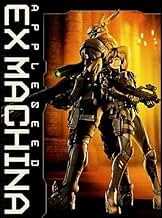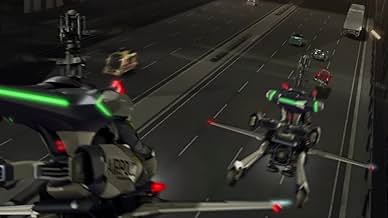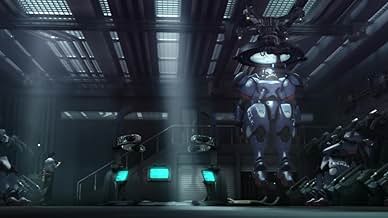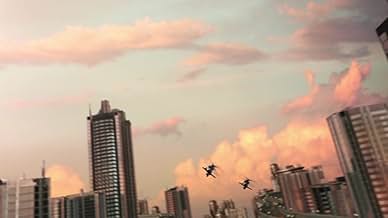AVALIAÇÃO DA IMDb
7,0/10
9,9 mil
SUA AVALIAÇÃO
Adicionar um enredo no seu idiomaWith Brialeos convalescing after a mission, Deunan is assigned a new and remarkably familiar partner as a strange wave of terrorist attacks plague Olympus.With Brialeos convalescing after a mission, Deunan is assigned a new and remarkably familiar partner as a strange wave of terrorist attacks plague Olympus.With Brialeos convalescing after a mission, Deunan is assigned a new and remarkably familiar partner as a strange wave of terrorist attacks plague Olympus.
- Prêmios
- 1 indicação no total
Ai Kobayashi
- Deunan Knute
- (narração)
Kôichi Yamadera
- Brialeos Hecatombcales
- (narração)
Yûji Kishi
- Tereus
- (narração)
Kong Kuwata
- Aeacus
- (narração)
Shinpachi Tsuji
- Commander Lance
- (narração)
Gara Takashima
- Athena
- (narração)
Tomoko Furakawa
- Nike
- (narração)
Rica Fukami
- Yoshino
- (narração)
Takaya Hashi
- Dr. Kestner
- (narração)
Miyuki Sawashiro
- Hitomi
- (narração)
Yasuyuki Kase
- Yoshitsune
- (narração)
Takaya Kuroda
- Arges
- (narração)
Naoko Kouda
- Dr. Xander
- (narração)
- Direção
- Roteiristas
- Elenco e equipe completos
- Produção, bilheteria e muito mais no IMDbPro
Enredo
Você sabia?
- CuriosidadesMusic supervisor Haruomi Hosono is a founding member of famed Japanese band Yellow Magic Orchestra, pioneers of the techno and electro-pop genres.
- Citações
Briareos: I'll always protect you, even if the world comes to an end.
Deunan Knute: I know you will.
- ConexõesFeatured in Troldspejlet: Episode #39.6 (2008)
- Trilhas sonorasRescue
Performed by Ryuichi Sakamoto & Haruomi Hosono & Yukihiro Takahashi
Courtesy of commmons/Avex Records
Avaliação em destaque
I've never been a huge fan of John Woo. I think Hard Boiled (1992) is one of the greatest action films ever made, and I liked The Killer (1989), A Better Tomorrow (1986), and Bullet In the Head (1990), but we need to be honest with ourselves and recognize that this guy sold his soul to Hollywood in the mid-1990s and hasn't made a great film since 1992.
He has, however, completely destroyed a sequel to one of the best American movies of recent memory (Mission Impossible) by over-Hollywoodizing a uniquely non-Hollywood film made by Hollywood. That's quite an ironic feat that he should be particularly ashamed of. Now we have Appleseed: Ex Machina (2007) to add to the list of Woo-ish debacles over the past 16 years.
This sequel to the exceptional anime drops the ball in a number of respects, yet still proves to be a marginally entertaining movie. The most obvious fault is that numerous events are near copies of science fiction movies from the West, thus making this endeavor much too conventional for a Japanese anime. In addition, the storyline wasn't as well-conceived as the original. Luckily, this movie has just enough positives to earn a watch. The protagonists are very likable characters, the plot is engaging, and the visuals are very good. The action scenes don't reach the levels of exoticism or quality of the original, but they are still moderately entertaining. In the end this is a very flawed picture that will only satisfy anime action junkies that can look around some mediocre elements. I'd give it a 6/10 compared to an 8/10 for the original.
Now, there were some very specific Woo-ish aspects that really annoyed me. First and foremost are the doves. Yes, there are heaping amounts of flying doves in this Japanese anime film! Why the hell is John Woo so obsessed with doves? Yeah, they provide some ironic symbolism during action scenes, but using them to the degree that he does I have no doubts that he touches himself to pictures of doves when he's alone at night. And the fact that he uses these little birdies in almost every one of his movies proves to be almost as annoying as Rob Zombie's habitual use of white trash folk in his movies. Yes, it's that annoying.
But wait. Maybe I'm jumping to conclusions regarding just how much influence Woo had in this watchable (yet severely disappointing) sequel. So I fired up the Special Features option on the DVD menu and watched the 16-minute "Making Of" featurette that focuses specifically on John Woo's influence as a producer. It provided some much needed information regarding just how far this has-been shell of a director has fallen. Let me run down some of the statements made by the Japanese director and producers of this film:
"This is the first time a big time Hollywood director has tried to tackle Japanese Anime."
So Woo isn't even recognized as a director of Chinese cinema anymore. How quaint. No one in this "Making Of" feature even mentioned his Chinese filmography.
"Japanese producers wanted to expand into the Western market and saw that working with John Woo would be a good match."
Nice. If your name is dropped by someone as the foremost expert in Hollywoodization, would you really take that as a compliment? Man, this guy has really hit rock bottom.
"John brought his years of experience in Hollywood to it."
Well, he certainly brought all of the negatives of Hollywood cinema to this production. That was obvious from watching the movie. How many times do you see a Japanese Anime film copy scenes from I Robot and The Matrix Revolutions? Yes, it's really, really pathetic.
The most enlightening statement was with regards to the preliminary Japanese storyboards.
"John took a look at it and came up with some really great notes."
What was particularly hilarious about this statement is that on-screen you see John Woo's head shaking in a disapproving, almost disgusted manner while watching the initial storyboards. It's almost like he's saying to himself, "This is way too Japanese for an American audience. We need more slow-mo shots and conventional elements to reach a wider audience and make more money." Nice job Johnny boy.
Director Shinji Aramaki apparently conceived Ex Machina to be nothing more than a tribute to Woo's work. He says:
"We devised the Cathedral scene before John showed up to pay homage to his work."
It's really too bad that Aramaki was so accommodating to implementing all of Woo's ideas into the film. It effectively crippled a movie that should have been as good as the original.
I hate to say it, but John Woo is a no-talent has-been who has only harmed the international film industry since making Hard Boiled in 1992. I have no problems with him making tripe in America. Heck, that's what American cinema is for. But don't you DARE to take your new-found money-grubbing mediocrity to Japanese anime.
Someone needs to stop this guy before he attempts to wreck another Asian movie.
He has, however, completely destroyed a sequel to one of the best American movies of recent memory (Mission Impossible) by over-Hollywoodizing a uniquely non-Hollywood film made by Hollywood. That's quite an ironic feat that he should be particularly ashamed of. Now we have Appleseed: Ex Machina (2007) to add to the list of Woo-ish debacles over the past 16 years.
This sequel to the exceptional anime drops the ball in a number of respects, yet still proves to be a marginally entertaining movie. The most obvious fault is that numerous events are near copies of science fiction movies from the West, thus making this endeavor much too conventional for a Japanese anime. In addition, the storyline wasn't as well-conceived as the original. Luckily, this movie has just enough positives to earn a watch. The protagonists are very likable characters, the plot is engaging, and the visuals are very good. The action scenes don't reach the levels of exoticism or quality of the original, but they are still moderately entertaining. In the end this is a very flawed picture that will only satisfy anime action junkies that can look around some mediocre elements. I'd give it a 6/10 compared to an 8/10 for the original.
Now, there were some very specific Woo-ish aspects that really annoyed me. First and foremost are the doves. Yes, there are heaping amounts of flying doves in this Japanese anime film! Why the hell is John Woo so obsessed with doves? Yeah, they provide some ironic symbolism during action scenes, but using them to the degree that he does I have no doubts that he touches himself to pictures of doves when he's alone at night. And the fact that he uses these little birdies in almost every one of his movies proves to be almost as annoying as Rob Zombie's habitual use of white trash folk in his movies. Yes, it's that annoying.
But wait. Maybe I'm jumping to conclusions regarding just how much influence Woo had in this watchable (yet severely disappointing) sequel. So I fired up the Special Features option on the DVD menu and watched the 16-minute "Making Of" featurette that focuses specifically on John Woo's influence as a producer. It provided some much needed information regarding just how far this has-been shell of a director has fallen. Let me run down some of the statements made by the Japanese director and producers of this film:
"This is the first time a big time Hollywood director has tried to tackle Japanese Anime."
So Woo isn't even recognized as a director of Chinese cinema anymore. How quaint. No one in this "Making Of" feature even mentioned his Chinese filmography.
"Japanese producers wanted to expand into the Western market and saw that working with John Woo would be a good match."
Nice. If your name is dropped by someone as the foremost expert in Hollywoodization, would you really take that as a compliment? Man, this guy has really hit rock bottom.
"John brought his years of experience in Hollywood to it."
Well, he certainly brought all of the negatives of Hollywood cinema to this production. That was obvious from watching the movie. How many times do you see a Japanese Anime film copy scenes from I Robot and The Matrix Revolutions? Yes, it's really, really pathetic.
The most enlightening statement was with regards to the preliminary Japanese storyboards.
"John took a look at it and came up with some really great notes."
What was particularly hilarious about this statement is that on-screen you see John Woo's head shaking in a disapproving, almost disgusted manner while watching the initial storyboards. It's almost like he's saying to himself, "This is way too Japanese for an American audience. We need more slow-mo shots and conventional elements to reach a wider audience and make more money." Nice job Johnny boy.
Director Shinji Aramaki apparently conceived Ex Machina to be nothing more than a tribute to Woo's work. He says:
"We devised the Cathedral scene before John showed up to pay homage to his work."
It's really too bad that Aramaki was so accommodating to implementing all of Woo's ideas into the film. It effectively crippled a movie that should have been as good as the original.
I hate to say it, but John Woo is a no-talent has-been who has only harmed the international film industry since making Hard Boiled in 1992. I have no problems with him making tripe in America. Heck, that's what American cinema is for. But don't you DARE to take your new-found money-grubbing mediocrity to Japanese anime.
Someone needs to stop this guy before he attempts to wreck another Asian movie.
- ebossert
- 15 de mar. de 2008
- Link permanente
Principais escolhas
Faça login para avaliar e ver a lista de recomendações personalizadas
- How long is Appleseed: Ex Machina?Fornecido pela Alexa
Detalhes
- Data de lançamento
- País de origem
- Centrais de atendimento oficiais
- Idioma
- Também conhecido como
- Cuộc Chiến Tương Lai 2: Người Máy Nổi Dậy
- Empresas de produção
- Consulte mais créditos da empresa na IMDbPro
Bilheteria
- Faturamento bruto mundial
- US$ 662
- Tempo de duração1 hora 45 minutos
- Cor
- Proporção
- 1.85 : 1
Contribua para esta página
Sugerir uma alteração ou adicionar conteúdo ausente

Principal brecha
By what name was Appleseed: Ex Machina (2007) officially released in India in English?
Responda

















